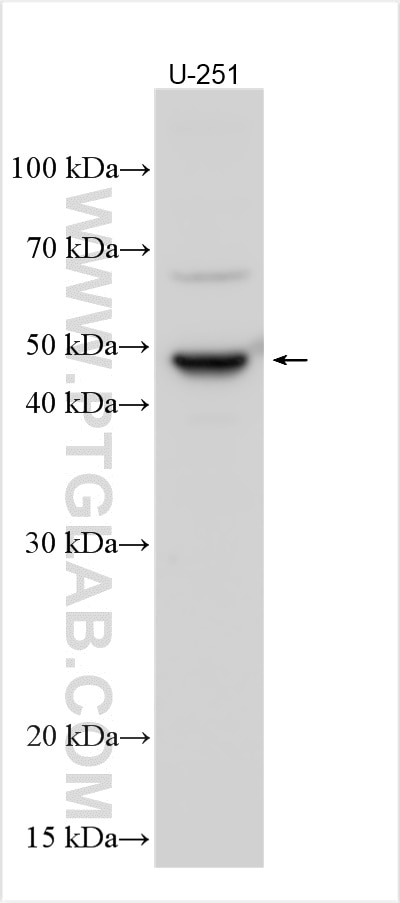Tested Applications
| Positive WB detected in | U-251 cells |
Recommended dilution
| Application | Dilution |
|---|---|
| Western Blot (WB) | WB : 1:500-1:1000 |
| It is recommended that this reagent should be titrated in each testing system to obtain optimal results. | |
| Sample-dependent, Check data in validation data gallery. | |
Product Information
13728-1-AP targets KERA in WB, ELISA applications and shows reactivity with human samples.
| Tested Reactivity | human |
| Host / Isotype | Rabbit / IgG |
| Class | Polyclonal |
| Type | Antibody |
| Immunogen |
CatNo: Ag4689 Product name: Recombinant human KERA protein Source: e coli.-derived, PGEX-4T Tag: GST Domain: 24-331 aa of BC032667 Sequence: RQVYEVHDSDDWTIHDFECPMECFCPPSFPTALYCENRGLKEIPAIPSRIWYLYLQNNLIETIPEKPFENATQLRWINLNKNKITNYGIEKGALSQLKKLLFLFLEDNELEEVPSPLPRSLEQLQLARNKVSRIPQGTFSNLENLTLLDLQNNKLVDNAFQRDTFKGLKNLMQLNMAKNALRNMPPRLPANTMQLFLDNNSIEGIPENYFNVIPKVAFLRLNHNKLSDEGLPSRGFDVSSILDLQLSHNQLTKVPRISAHLQHLHLDHNKIKSVNVSVICPSPSMLPAERDSFSYGPHLRYLRLDGNE Predict reactive species |
| Full Name | keratocan |
| Calculated Molecular Weight | 352 aa, 41 kDa |
| Observed Molecular Weight | 40-50 kDa |
| GenBank Accession Number | BC032667 |
| Gene Symbol | KERA |
| Gene ID (NCBI) | 11081 |
| RRID | AB_3669169 |
| Conjugate | Unconjugated |
| Form | Liquid |
| Purification Method | Antigen affinity purification |
| UNIPROT ID | O60938 |
| Storage Buffer | PBS with 0.02% sodium azide and 50% glycerol, pH 7.3. |
| Storage Conditions | Store at -20°C. Stable for one year after shipment. Aliquoting is unnecessary for -20oC storage. 20ul sizes contain 0.1% BSA. |
Background Information
Keratocan and Lumican are the predominant class II SLRPs(Small leucine-rich proteoglycans) in the corneal stroma. While not totally corneal-specific together these SLRPs are excellent biomarkers for the tissue. Mutant mice deficient for keratocan expression have transparent but thin corneal stromas with a mild increase in collagen fibril diameter with no further abnormalities.In humans, mutations in the keratocan gene are associated with a flattened cornea in a rare condition known as cornea plana. The relative specificity of keratocan to corneal keratocytes has been useful for tissue-specific targeting for genetic manipulation of the corneal stroma.(PMID: 32663498)
Protocols
| Product Specific Protocols | |
|---|---|
| WB protocol for KERA antibody 13728-1-AP | Download protocol |
| Standard Protocols | |
|---|---|
| Click here to view our Standard Protocols |




